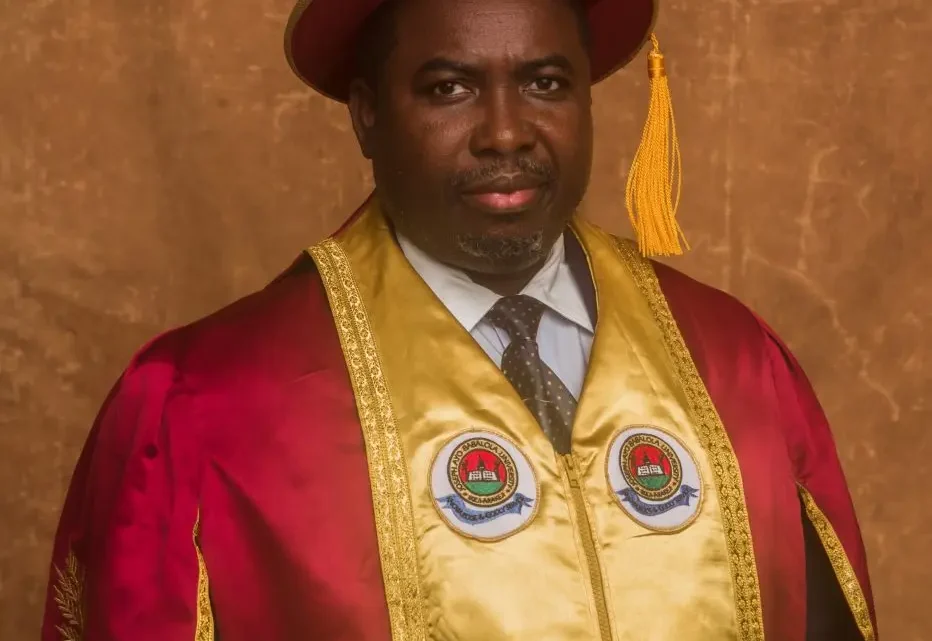
Tinubu Appoints Amupitan as INEC Chairman: Reform or Political Ploy?
President Bola Ahmed Tinubu officially swore in Professor Joash Ojo Amupitan, SAN, as the new Chairman of the Independent National Electoral Commission (INEC) at the State House Council Chambers in Aso Villa, Abuja, on Thursday, October 23, 2025.
The event, held just before an expanded meeting of the National Economic Council, followed the Senate’s confirmation of Amupitan on October 16, 2025, and signals a fresh chapter aimed at bolstering public confidence in the nation’s democratic processes ahead of future polls, including the 2027 general elections.
Trending Now!!:
Amupitan, dressed in a traditional white agbada and gold cap, exchanged pleasantries with dignitaries and guests before taking the oath of office, administered by President Tinubu, who charged him to uphold the integrity of Nigeria’s elections, enhance INEC’s institutional capacity, and ensure transparent and credible electoral outcomes.
In response, Amupitan reiterated his commitment to reforms that would make elections so fair that even losing candidates would congratulate winners, emphasizing his dedication to political neutrality and dismissing any prior involvement in the 2023 presidential election petitions.
Born on April 25, 1967, in Ayetoro Gbede, Ijumu Local Government Area of Kogi State, the 58-year-old Amupitan is a distinguished legal scholar and the first individual from Nigeria’s North-Central region to lead INEC.
A Professor of Law at the University of Jos, he specializes in the Law of Evidence, Corporate Governance, Corporate Law, and Privatization Law. As a Senior Advocate of Nigeria (SAN), Amupitan holds a prestigious title recognizing his exceptional contributions to the legal profession.
His academic and professional journey includes serving as the Pro-Chancellor and Chairman of the Governing Council at Joseph Ayo Babalola University, where he was inaugurated during the council’s 48th meeting.
Amupitan‘s extensive experience in legal practice and academia, particularly in electoral law and governance, has positioned him as a key figure to lead INEC. During his Senate screening, he pledged to prioritize transparency, technological advancements in voting processes, and efforts to combat electoral malpractices.
His appointment, unanimously approved by the National Council of State on October 9, 2025, followed President Tinubu‘s nomination to replace the outgoing chairman, and Amupitan is expected to assume full duties immediately at INEC headquarters, overseeing the transition and preparing for off-cycle elections and the broader 2027 cycle.
President Tinubu, Nigeria’s leader since his inauguration in May 2023, emphasized the need for a robust electoral system to sustain democracy, highlighting Amupitan‘s legal expertise, integrity, and apolitical stance as key reasons for the choice.
Tinubu, a former governor of Lagos State and a prominent figure in the All Progressives Congress (APC), stated during the National Council of State meeting that Amupitan‘s nomination was rooted in his proven track record of impartiality and dedication to legal principles that would restore faith in elections.
Having faced scrutiny over electoral processes since the controversial 2023 elections, Tinubu‘s administration views Amupitan’s appointment as a step toward addressing criticisms and implementing reforms to prevent glitches and disputes. The president also bestowed the national honor of Commander of the Order of the Niger (CON) on the outgoing chairman as a gesture of appreciation for his service.
Amupitan succeeds Professor Mahmood Yakubu, whose second and final five-year term ended in October 2025. Appointed in 2015 by former President Muhammadu Buhari, Yakubu oversaw the 2019 and 2023 general elections, which were marred by allegations of irregularities, technical failures in electronic result transmission, and low voter turnout, leading many Nigerians and observers to describe his tenure as “disastrous” due to persistent issues like vote-buying, violence, and system glitches that eroded public trust.
Yakubu formally handed over to May Agbamuche-Mbu, a national commissioner, as acting chairman on October 7, 2025, pending the new appointment. Tinubu accepted Yakubu‘s departure and commended his efforts in advancing electoral technology, despite the controversies.
The International Institute for Democracy and Electoral Assistance noted the high stakes involved in INEC’s leadership transition, given Nigeria’s upcoming elections just 15 months away.
The appointment occurs against a backdrop of heightened demands for electoral reforms in Nigeria, Africa’s most populous nation, with civil society groups, opposition parties, and international observers calling for improvements in voter registration, result collation, and the use of technology to minimize human interference.
Amupitan‘s legal background is seen as an asset in navigating ongoing litigations from past elections and implementing changes to rebuild trust. Politically, the move has garnered support across party lines, with figures like former Bayelsa Governor Henry Seriake Dickson praising the nomination.
However, some critics question whether a single leadership change can address systemic issues like funding shortages and security challenges during polls. As Amupitan steps into the role, all eyes will be on INEC’s preparations for by-elections and the 2027 vote, which could define Tinubu‘s legacy on democratic governance.
Established in 1998, INEC is responsible for organizing elections, voter education, and delimiting constituencies, and with Amupitan at the helm, the commission aims to enter a “new era” of credibility and efficiency.
The development has sparked widespread reactions on social media, with users expressing optimism for fairer elections while reflecting on the challenges ahead, as Nigeria continues its democratic journey under Amupitan‘s leadership.


